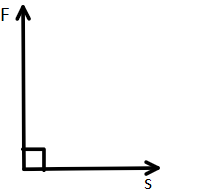Question
Question: Calculate the work done by a coolie in carrying a load of mass \(10kg\) on his head when he walks un...
Calculate the work done by a coolie in carrying a load of mass 10kg on his head when he walks uniformly a distance of 5m in the (i) Horizontal direction (ii) Vertical direction (take g=10ms−2)
A) 500,0
B) 0,500
C) 1,500
D) 500,3
Solution
Work done on an object or by an object is the amount of force that displaces it by unit displacement. Or we can say that if there is no displacement at all, no matter what amount of force we put, the net work done will be zero. Horizontal work means, work done along the x-axis and vertical work done means along the y-axis in our frame of reference.
Complete step by step answer:
Work done on an object or by an object is simply the force expended to displace it for a certain displacement. Mathematically it is defined as the scalar product or dot product of expended force and resulting displacement.
W=F⋅s
⇒W=Fscosθ
Where W is the work done for a displacement of s by the force F
In the given problem, the coolie is carrying a load of 10kg over his head and moving in a horizontal displacement of 5m .
In horizontal displacement, force is expended by the coolie along the y-axis and the displacement vector is along the x-axis as shown in the following diagram.

Thus the work done is given by
⇒W=Fscos90∘
Putting the value of cos90∘ , this work done is zero.
This answers (i)
Now, if the vertical displacement, the coolie has worked against acceleration due to gravity and displaced the box 5m upwards along the direction of force that is along the y-axis.
So work done in vertical displacement is given by
⇒W=Fscos0∘
Now we know from Newton’s second law,
F=mg
Putting the respective values of terms in the above equation we get, F=100N
Now substituting the value of force and vertical displacement in the expression of vertical work done, we get
⇒W=500J
This answers (ii)
So the correct selection is, option B.
Note: If the net displacement turns out to be zero when solving a problem, the work done will also be zero. There are often questions asked with application of this trick. One should know the use of frame of reference and resolving vectors along axes. And also, don’t forget to check the system of units.
